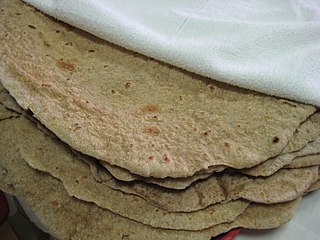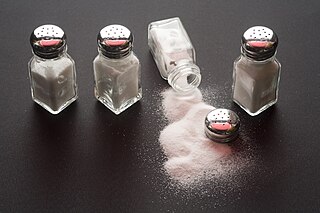
Bread is a staple food prepared from a dough of flour and water, usually by baking. Throughout recorded history and around the world, it has been an important part of many cultures' diet. It is one of the oldest human-made foods, having been of significance since the dawn of agriculture, and plays an essential role in both religious rituals and secular culture.
Soda or SODA may refer to:

David Ashworth Gates is a retired American singer-songwriter, guitarist, musician and producer, frontman and co-lead singer of the group Bread, which reached the top of the musical charts in Europe and North America on several occasions in the 1970s. The band was inducted into the Vocal Group Hall of Fame.

A bagel is a bread roll originating from Poland. It is traditionally shaped by hand into a roughly hand-sized ring from yeasted wheat dough that is first boiled for a short time in water and then baked. The result is a dense, chewy, doughy interior with a browned and sometimes crisp exterior.

A ploughman's lunch is an English cold meal based around bread, cheese, and fresh or pickled onions. Additional items can be added such as ham, green salad, hard boiled eggs, and apple, and usual accompaniments are butter and "pickle", which in Britain denotes a chutney-like condiment. As its name suggests, it is most commonly eaten at lunchtime. It is particularly associated with pubs, and often served with beer.

Bouillabaisse is a traditional Provençal fish stew originating in the port city of Marseille. The French and English form bouillabaisse comes from the Provençal Occitan word bolhabaissa, a compound that consists of the two verbs bolhir and abaissar.

Challah is a special bread of Ashkenazi Jewish origin, usually braided and typically eaten on ceremonial occasions such as Shabbat and major Jewish holidays. Ritually acceptable challah is made of dough from which a small portion has been set aside as an offering. Challah may also refer to the dough offering. The word is biblical in origin, though originally referred only to the dough offering. Similar braided breads such as kalach and vánočka are found across Central and Eastern Europe.

Boxty is a traditional Irish potato pancake. The dish is mostly associated with the north midlands, north Connacht and southern Ulster, in particular the counties of Leitrim, Mayo, Sligo, Donegal, Fermanagh, Longford, and Cavan. There are many recipes but all contain finely grated, raw potatoes and all are served fried.

A cheese sandwich is a sandwich made with cheese on bread. Typically semi-hard cheeses are used for the filling, such as Cheddar, Red Leicester, or Double Gloucester. A Guardian article called the cheese sandwich a "British lunchtime staple". Using a sandwich toaster or frying pan can transform the cheese sandwich into a cheese toastie.

A flatbread is a bread made with flour; water, milk, yogurt, or other liquid; and salt, and then thoroughly rolled into flattened dough. Many flatbreads are unleavened, although some are leavened, such as pizza and pita bread.

A trencher is a type of tableware, commonly used in medieval cuisine. A trencher was originally a flat round of bread used as a plate, upon which the food could be placed to eat. At the end of the meal, the trencher could be eaten with sauce, but could also be given as alms to the poor. Later the trencher evolved into a small plate of metal or wood, typically circular and completely flat, without the lip or raised edge of a plate. Trenchers of this type are still used, typically for serving food that does not involve liquid; for example, the cheeseboard.

Markook bread, also known as khubz ruqaq, shrak, khubz rqeeq, mashrooh, and saj bread, is a kind of Middle Eastern unleavened flatbread common in the Levant and the Arabian peninsula. It is baked on a convex metal griddle or in a tannour.

Bread and salt is a welcome greeting ceremony in some Slavic, Nordic, Baltic, Balkan and other European cultures as well as in Middle Eastern cultures. It is also shared with some non-Slavic nations—Lithuanians, Latvians, Romanians (Romance) as well as some Finno-Ugric peoples like the Karelians—all of which are culturally and historically close to their Slavic neighbours. It remains common in Albania, Armenia, and among the Jewish diaspora. This tradition has also been observed in spaceflight.

Our Daily Bread is a 2005 documentary film directed, co-produced, and with cinematography by Nikolaus Geyrhalter. The script was co-written by Wolfgang Widerhofer and Nikolaus Geyrhalter.
Salt and pepper are a commonly paired set of condiments for European style cuisine.

A superstition in Western cultures holds that spilling salt is an evil omen. However, salt has had a variety of meanings in religions around the world.

Acquacotta is a hot broth-based bread soup in Italian cuisine that was originally a peasant food. Its preparation and consumption dates back to ancient history, and it originated in the coastal area known as the Maremma in southern Tuscany and northern Lazio. The dish was invented in part as a means to make hardened, stale bread edible. In contemporary times, ingredients can vary, and additional ingredients are sometimes used. Variations of the dish include aquacotta con funghi and aquacotta con peperoni.














